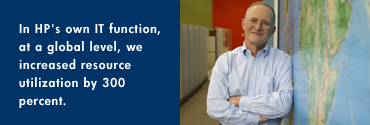
By Jamie Beckett, Oct. 2005
How's this for research results? Thanks in part to technology
from HP Labs, HP was able to squeeze more use out of
its IT resources and dramatically cut global IT costs.
The technology: It's actually a bundle of software innovations
called SASU, for shared application server utility, which
allows organizations to consolidate IT resources, securely
pool and share them and more easily design, test and deploy
new applications.
"In our own IT function, at a global level, we reduced
Total Cost of Ownership by 70 percent, increased utilization
by 300 percent -- and saved millions of dollars in hardware,
people and software," said Dick Lampman, HP senior
vice president for research and director of HP Labs.
But utility computing technologies like SASU have the
potential to do much more than cut IT costs, Lampman told
executives attending HP's Government and Education IT Summit
in San Diego, CA.
"Utility computing can and will make government more
efficient, education more effective and average citizens
more empowered," Lampman said.
The shared application server utility is just a first
step. What's next?
"What if you need compute power, but don't know how
much you'll need to get your job done?" Lampman asked. "You
can already purchase by the hour but what if you want the
option of buying when it’s cheap? How would you do
that?"
Researchers at HP Labs have been working on a market-resource
allocation tool they call "tycoon"
that could one day allow organizations
to bid for processor cycles, memory, disk storage and network
bandwidth.
"It is like a 10-second-or-less stock market or bidding
on eBay," Lampman said.
Today, the technology is
being tested by CERN, the world’s largest particle
physics laboratory, doing formidable work in grid-computing
research, and in HP Labs, where a financial services prototype
is being developed.
"The agility of this system goes beyond anything
being sold today," Lampman said. For example, a user
running an application who realizes he's not going to finish
on time would have the option of pumping additional funds
into the project and obtaining additional IT resources
that would speed up processing.
That's one kind of agility. In a whole different take
on agility, researchers are developing advanced technologies
for HP's Indigo digital press, which makes it possible
for organizations to produce low-cost, short-run printed
documents that have the look and feel of high-end offset
printed materials. Brochures, manuals, handouts and other
documents can even be personalized.
"This capability to personalize can bring surprising
results," Lampman said, noting that a Idaho college
last year increased its response rate to a recruiting brochure
from 2 percent to 18 percent by using brochures personalized
with prospective students' first names and materials on
academic and extra-curricular programs tailored to individual
students' interests.
The high image quality is determined by the unique technology
used in the press. It’s called liquid electrophotography – LEP
for short. LEP uses wet ink particles instead of the dry
toner that’s used by all other digital presses.
Another key area of focus at HP Labs is on building trust
and security at all levels of computing systems. In one
key project, HP and industry partners have created a Trusted
Platform Module that would provide a secure hardware platform.
This platform could then be used to verify all of the software
on an organization's system.
Another technology, called Trust Record, is designed to
transform the complexity of audit and management system
reports to something as simple as a standard utility bill.
In addition, the data also provides the data protection required
by government regulations like Sarbanes-Oxley.
But researchers aren't just focused on large computing
systems. One team is developing software that could provide
virus-safe computing at the desktop level. Currently, all
major operating systems are designed in such a way that
each program mirrors the rights of the logged-in user,
meaning it has open access to anything on the user's PC.
The problem, Lampman said, "is that every program
you run is allowed to do anything you can do, whether you
want it done or not."
The researchers' program is based on the Principal of
Least Authority – a technique that limits the rights
of each computer program.
"Our researchers believe each program should only
have the authority it needs to do the job the user wants
done," Lampman said. "Security, privacy and trust
issues are ongoing, priority areas of research in HP Labs."
Jamie Beckett is managing editor of the HP Labs Web site and
a veteran newspaper reporter and editor. |

